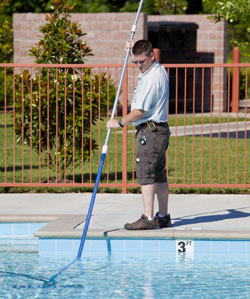
Tips On Cleaning A Salt Water Pool
When thinking about maintaining your pool, you might be fascinated to learn that there is not a big difference between a salt water pool and a fresh water pool. But they are not really the same either. Salt and fresh water pools have as many differences as similarities. Therefore, each type of salt water and fresh water pool must be maintained in a unique way. The upside of this is that there is a perfect way to maintain your pool, no matter what type it is.
A major difference in cleaning and maintenance of a salt water pool has to do with the chlorine generator. A chlorine generator removes the salt from the salt water pools and uses electrolysis to change it into hypochlorous acid. All chlorine is essentially made of hypochlorus acid. The chlorine generator needs a lot of attention via regular cleanings. It is necessary for any mineral deposits to be removed right away, or the chlorine generator will stop working. Your swimming pool will be quite vulnerable to becoming contaminated if your chlorine generator ceases to function. It is possible for algae and other undesirable bacteria to grow quickly in pool water that has not been treated, and that can cause many problems with regard to your pool's maintenance as well as to your overall health.
You should also concentrate on the water pump as you go about cleaning a salt water pool. Salt from the pool water can get stuck in the pump's water filter. After a period of time, the salt builds up and crystallizes; after the crystallization stage, you may find that your swimming pool's pump is not as efficient. The worst thing that can happen is that your pump could be destroyed by crystallized salt buildup. Then you'd have to purchase a new pump. Many people who own salt water pools have had to deal with the issue of salt crystallization for many years. Even though numerous newer swimming pools, including both fresh water and salt water pools, have salt water filtration systems, many of the older swimming pools do not have these types of systems. Therefore, it is a good idea to make sure the pipes that carry water away from your pool or to your pool are cleaned every three or four months in order to prevent crystallization of salt.
The salt in salt water pools can damage the pool's lining if not properly maintained. A frequent complaint from those who have begun using salt water in their pools instead of fresh water is that their pool linings are becoming dried out due to the salt water, and the linings are brittle and frail. You can prevent this from occurring to your pool by either of the following methods: scrubbing the lining of the pool every 4 to 6 weeks or coating the lining of the pool with an anti-salt solution.
There are multiple things to think about when getting involved with salt water pools. Although they need more upkeep and attention than pools with fresh water, people who have salt water love it.
Tip: If you want a professional to handle your pool, contact a pool cleaning company today.

